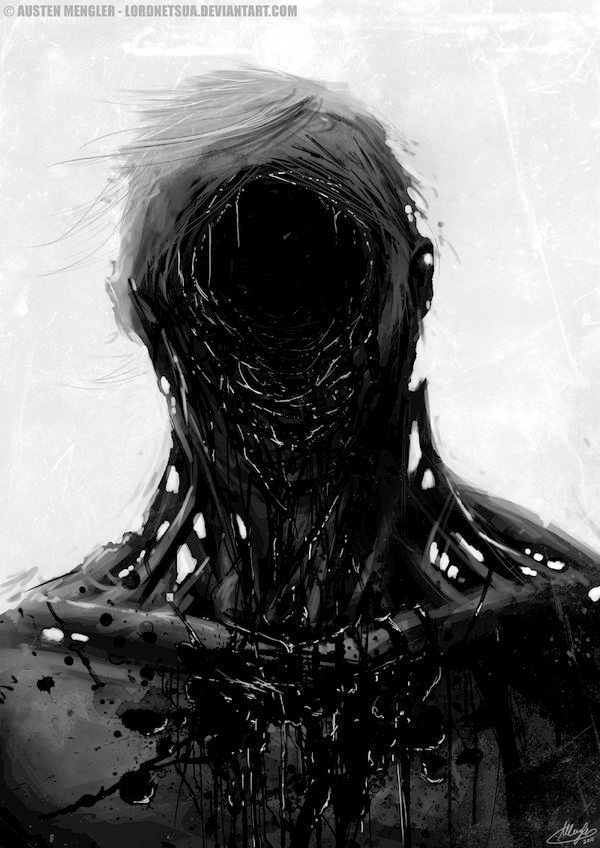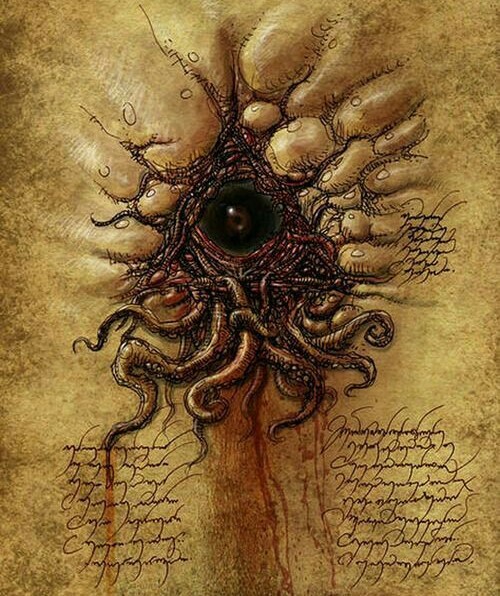The Oath-breaker
Traitor,
Coward,
Cannibal,
Oath-breaker - foulest of all creatures so wretched, even the Clanless spit upon your name.
The Oath-breaker is a creature of Dhanûian mythology, a man twisted into an abhorrent abomination by the weight of his crimes. Every single oath and obligation he swore was broken and every promise forsaken, until even his mask refused to cover his face and tore itself from him. Since then, he has been cursed to wander the darkness with a gaping and always bleeding hole where his face should be.
Children are warned to obey their parents and warriors who stray cautioned with the same tale - if they are not careful, the Oath-breaker will smell their lies and come for them.
Curse of the Oath-breaker
His nails are sharp,
His skin is rotten,
His step is close,
You're soon forgotten.
The Oath-breaker is variously described as a hulking brute or a decrepit ghoul by skalds, depending on the exact audience of the tale. Only the bleeding hole in his head remain a constant and he is sometimes said to "eat" people with it. In tales where he is an ancient foe of Dhanû, he is either rotting or covered in frost. When told to children or workers, it is a tale of morality and of staying true to ones obligations. In these, the Oath-breaker is an unstoppable terror that drag naughty children, liars and uppity peasants off into the night.
When told to warriors and nobles, the tale come in two very different ways - the most common being where the supernatural terror can only be defeated by staying true to ones virtues and obligations. There's a morbid fascination with stoicism in all Dhanûian stories and theater, so even in these versions the hero typically dies in the end. There are few happy endings.
The second, more recent version focuses more on the Oath-breaker himself. In these stories, he is the focus and the central protagonist. This version is a relatively much less common, but they explore what turned the Oath-breaker into what he is. Love, betrayal, devils or gods are sometimes added to the elements that made him break his oaths, though this is sometimes controversial. Skalds are discouraged from these new ideas and the classics are instead held up as the ideal.
Broken Promises
He pressed his broken face against the spreading pool of blood, no longer a man but a monster. They watched as the pool shrunk and disappeared with a loud slurp, like a drunkard with his favorite drink.
It isn't certain where the tale originally arose. No clan is eager to claim that the Oath-breaker was, even in some distant past, one of theirs. The blame is either passed around or simply put to some to some clan long destroyed and forgotten. In the latter case, their destruction is sometimes blamed on the Oath-breaker as a grisly murderer. In some versions, he is even a peasant - though these are distinctly unpopular with clan-warriors and nobles, as the Oath-breaker usually fells a number of them throughout the stories.
Every now and then, a pile of bloodied bones are found somewhere in Dhanû. A child goes missing. People disappear and are never found. Blood splatter the walls of a cavern or tunnel end. The Oath-breaker is never far from people's mind in such times and whispers of seeing a man without face begin across the city-state.
The Dhanûian The Oathbreaker is a myth sprung from the complex weave of obligation that hold Dhanûian society together. They are a strong and proud folk, with the Oathbreaker anathema to all they hold as virtues. Read More About Dhanûian
Every Ill Imagined
The Oathbreaker is ascribed every kind of sin, from cannibalism or blood-drinking to kin-slaying and cowardice. Whatever flaw or fault is more keenly despised in Dhanû at any given time tend to be the one given to the Oathbreaker. As time changes the city-state, so does the Oathbreaker legend twist and mutate.Skalds and Singers
There is a strong tradition of storytelling in Dhanû, most often in the form of song or poetry. Skalds, or bards, are entertainers that keep these stories alive through generations. Traditionally, these songs were passed down verbally and painstakingly memorized by each new apprentice skald. These days, the stories are written down as well. Some traditionalists bemoan the fact, but most clans keep a archive of stories.A witty poem or rousing song can open many doors. For this reason, skalds usually act as eyes and ears for their clan.





Creepy, disturbing, brutal and gory. I'd expect none less from a scary story for children within Araea! The rhyme from the "Curse of the Oath-breaker Saga" was absolutely perfect, just adds such wonderful flair!
Thank you <3 :D
Creator of Araea, Megacorpolis, and many others.